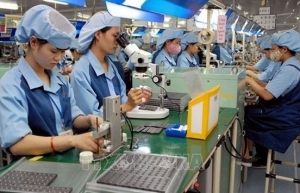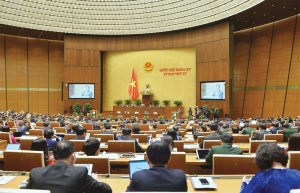Nation braced for dim job prospects
Since last October, Pham Manh Hung has been struggling to feed his five-member family. Hung has been forced into a reduction of working hours, while his wife last worked for an apparel company in Hanoi almost a year ago.
For most of 2022, all 1,500 workers at Hung’s company in Hanoi’s Quang Minh Industrial Park (IP), producing furniture products exported to Europe and Japan, operated at full speed with many export orders coming from foreign partners.
 |
| Prolonged economic difficulties will inevitably mean that some people will be squeezed out of work, photo Le Toan |
“However, over the past seven months, the company has landed only several orders. So its leadership has been seeking more markets for its products in order to create employment and retain workers,” Hung said. “They don’t want to let go of workers and instead reduce the working hours by two hours a day.”
Meanwhile, his wife, Nguyen Thi Mo, had been working for a Japanese firm in the capital’s Thang Long IP for five years. However, the company, manufacturing electronics and plastics equipment, made a cutback of 300 employees including Mo, whose monthly income was about VND8 million ($350).
“Our company had to narrow down production due to a reduction in export orders from Japan, South Korea, and some European markets,” Mo said.
In Duong Noi and Kim Chung communes in Dong Anh district where the couple live, thousands of people are facing working hour cutbacks and unemployment, many from Thang Long and Quang Minh IPs, and others.
According to the General Statistics Office (GSO), the total number of unemployed people hit 1.07 million last year, down from 3.15 million people in 2022.
Wider uncertainties
In the first four months of this year, despite no official figures on unemployment yet being reported, the number of businesses nationwide with halted operations reached nearly 50,000, up 21.8 per cent on-year. Nearly 21,000 enterprises stopped operations and waited for dissolution procedures, up nearly 40 per cent. Some 6,100 businesses completed such procedures, up 10.1 per cent. On average, each month saw 19,275 enterprises kicked out of the market.
If each enterprise employs 20 labourers, the total number of unemployed labourers is 385,500 a month and 1.54 million in the four months.
The government underlined that in the first months of this year, the global situation remained complicated and difficult to predict.
“A slash in consumption in many major economies has led to a big reduction in global production, trade, and investment. Global inflation has shown signals of reduction, but is still at a high level. This has badly affected Vietnam’s economy and employment situation,” said the government report submitted to the National Assembly Standing Committee two weeks ago.
The government has warned that if economic difficulties are prolonged at a severe level, more unemployment will come, and production and export will be affected due to disrupted supply chains. Vietnam’s index for industrial production (IIP) in April increased 0.5 per cent as compared to the same period last year, when the IIP rose 10.7 per cent on-year. However, poor performance of many enterprises has caused an on-year 1.8 per cent drop in the first four months of this year. In the corresponding period last year, the rate expanded 7.8 per cent on-year.
“This is due to the global economy’s slow recovery and the tightened monetary policy applied in many nations, leading to a slash in consumption demands of Vietnam’s key trade partners, and this has resulted in a reduction in production orders and export turnover,” the GSO stressed.
Vietnam’s four-month export turnover is estimated to hit $108.6 billion, down 11.8 per cent on-year. The country’s export value from all of its key markets witnessed a big decrease, including China (7.9 per cent), the US (22.1 per cent), South Korea (6.9 per cent), ASEAN (1.3 per cent), the EU (14.1 per cent), and Japan (0.9 per cent). Meanwhile, Vietnam’s imports in the first four months from these markets also saw a shrink, at 13.4, 11.9, 25.7, 17.1, 17, and 12.8 per cent, respectively.
The Ministry of Labour, Invalids, and Social Affairs (MoLISA) confirmed that since Q4 of 2022, many firms have had to reduce their performance, resulting in many employees suffering from unemployment and a reduction in working hours.
These enterprises are largely found in labour-intensive foreign-invested enterprises in the sectors of furniture, garments and textiles, and footwear. In addition to some in Hanoi, many others are found in localities including Bac Giang, Hai Duong, Ninh Binh, Thanh Hoa, Nghe An, Tay Ninh, Binh Duong, Dong Nai, Ho Chi Minh City, Tien Giang, and Vinh Long.
At a press conference last week, Nguyen Van Lam, deputy director of Ho Chi Minh City Department of Labour, Invalids, and Social Affairs informed that Taiwan’s PouYuen Vietnam Co., Ltd in Binh Tan district plans to terminate the labour contracts with 5,744 employees. The age group for these employees include 21-30 years old (6.8 per cent), 30-40 years old (39.6 per cent), over 40 years old (53.6 per cent).
Offering assistance
It is expected that more support for struggling enterprises and unemployed people in Vietnam will dominate the 15th National Assembly’s (NA) fifth session (see box).
| The fifth session of the 15th National Assembly, lasting from May 22 to June 23, will focus on discussing the results of updated reports on carrying out the nation’s socioeconomic development plan and state budget in 2022, and solutions on implementing the same plan for this year. In addition, the legislature will also debate and approve a total of eight laws: the Law on Protection of Consumer Rights (revised); Law on Bidding (revised); Law on Price (revised); Law on Electronic Transactions (revised); Law on Cooperatives (revised); Law on Civil Defence (revised); amending and supplementing a number of articles of the Law on People’s Public Security Force; and amending and supplementing a number of articles of the Law on Exit and Entry of Vietnamese Citizens and the Law on Foreigners’ Entry into, Exit from, Transit through, and Residence in Vietnam. The legislature will also provide comment for eight laws: the Law on Land (amended); Law on Real Estate Business (revised); Law on Housing (amended); Law on Water Resources (revised); Law on Telecommunications (amended); the draft Law on the Management, Protection and Utilisation of Defense Projects and Military Zones; the Law on Citizen Identification (amended); and the Law on Credit Institutions (revised). The session will also feature Q&A activities. |
The legislature will discuss the results of updated reports on carrying out the nation’s socioeconomic development plan and state budget in 2022, and solutions on implementing the same plan for this year. The NA is also expected to debate how to assist enterprises undermined by global geopolitical tensions, and provide sufficient jobs for unemployed people.
Chairman of Vietnam Fatherland Front’s Central Committee Do Van Chien cited a report embracing ideas sent to the fifth NA session, stating that the public are showing “great concern” about the macroeconomic situation remaining unstable, high inflation, businesses bankruptcies, and high unemployment.
“Enterprises are facing massive difficulties in access to bank loans, finding new markets, rising operational costs, and high prices in input materials,” Chairman Chien said. “The IIP has reduced remarkably, especially in the processing and manufacturing sector, while Vietnam’s key export markets have decreased their demands for imports. This has badly affected the government’s efforts to create more employment.”
NA deputy Vu Tien Loc, representing the northern province of Thai Binh, stressed, “Enterprises are now still bogged down in great difficulties, especially small- and medium-sized enterprises – mostly those operating in the sectors of service and production.”
Prime Minister Pham Minh Chinh has tasked the MoLISA to combine with other relevant ministries and agencies to formulate a scheme on supporting labourers, and the
MoLISA will review all policies and report back by the end of this month.
However, Nguyen Thi Mo in Dong Anh district lamented that though the government has applied many initiatives to support unemployed people like her, she does not know how to benefit from them.
“I have heard about a scheme which is part of the national $15 billion Programme on Socioeconomic Recovery and Development, but on several occasions I have talked to authorities in the locality, and they insist they do not know anything about it,” Mo said.
For example, she said, the government has since April 2020 applied a $2.69 billion package to support the unemployed, but those like her have never been able to access it. “Over recent months, I have become a temporary labourer, but the work is off and on. What we need is stable employment to feed my family,” she said.
 | Unemployment insurance fund to soon complete payments for COVID-19-hit employees More than 339,000 employees affected by the COVID-19 pandemic have received a total of 963 billion VND (41.12 million USD) from the unemployment insurance fund as of 5:30 pm on August 25. |
 | Plenty still to do to stabilise businesses In spite of the domestic economy’s gradual recovery, Vietnam is facing high risks caused by a rise in unemployment and uncertainties in the global market affecting the country’s economic prospects. |
What the stars mean:
★ Poor ★ ★ Promising ★★★ Good ★★★★ Very good ★★★★★ Exceptional
Related Contents
Latest News
More News
- Tet event in Japan celebrates success of 14th National Party Congress (January 25, 2026 | 10:04)
- 14th National Party Congress wraps up with success (January 25, 2026 | 09:49)
- Congratulations from VFF Central Committee's int’l partners to 14th National Party Congress (January 25, 2026 | 09:46)
- List of newly-elected members of 14th Political Bureau announced (January 23, 2026 | 16:27)
- 14th Party Central Committee unanimously elects To Lam as General Secretary (January 23, 2026 | 16:22)
- List of members of 14th Party Central Committee announced (January 23, 2026 | 09:12)
- Highlights of fourth working day of 14th National Party Congress (January 23, 2026 | 09:06)
- Press provides timely, accurate coverage of 14th National Party Congress (January 22, 2026 | 09:49)
- Press release on second working day of 14th National Party Congress (January 22, 2026 | 09:19)
- Minister sets out key directions to promote intrinsic strength of Vietnamese culture (January 22, 2026 | 09:16)

 Tag:
Tag:




















 Mobile Version
Mobile Version